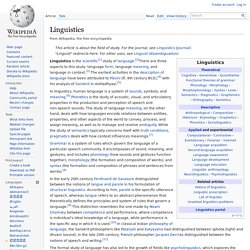

Phoneme. A phoneme is a basic unit of a language's phonology, which is combined with other phonemes to form meaningful units such as words or morphemes.

The phoneme can be described as "The smallest contrastive linguistic unit which may bring about a change of meaning". In this way the difference in meaning between the English words kill and kiss is a result of the exchange of the phoneme /l/ for the phoneme /s/. Morpheme. Classification of morphemes[edit] Free vs. bound[edit] Every morpheme can be classified as either free or bound.[3] These categories are mutually exclusive, and as such, a given morpheme will belong to exactly one of them. Bound morphemes can be further classified as derivational or inflectional. Allomorphs[edit] Linguistics. In the early 20th century Ferdinand de Saussure distinguished between the notions of langue and parole in his formulation of structural linguistics.

According to him, parole is the specific utterance of speech, whereas langue refers to an abstract phenomenon that theoretically defines the principles and system of rules that govern a language.[9] This distinction resembles the one made by Noam Chomsky between competence and performance, where competence is individual's ideal knowledge of a language, while performance is the specific way in which it is used.[10] In classical Indian philosophy of language, the Sanskrit philosophers like Patanjali and Katyayana had distinguished between sphota (light) and dhvani (sound). In the late 20th century, French philosopher Jacques Derrida distinguished between the notions of speech and writing.[11]